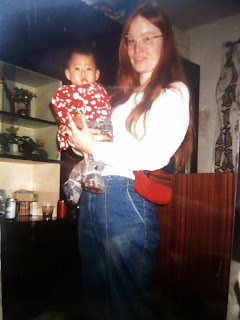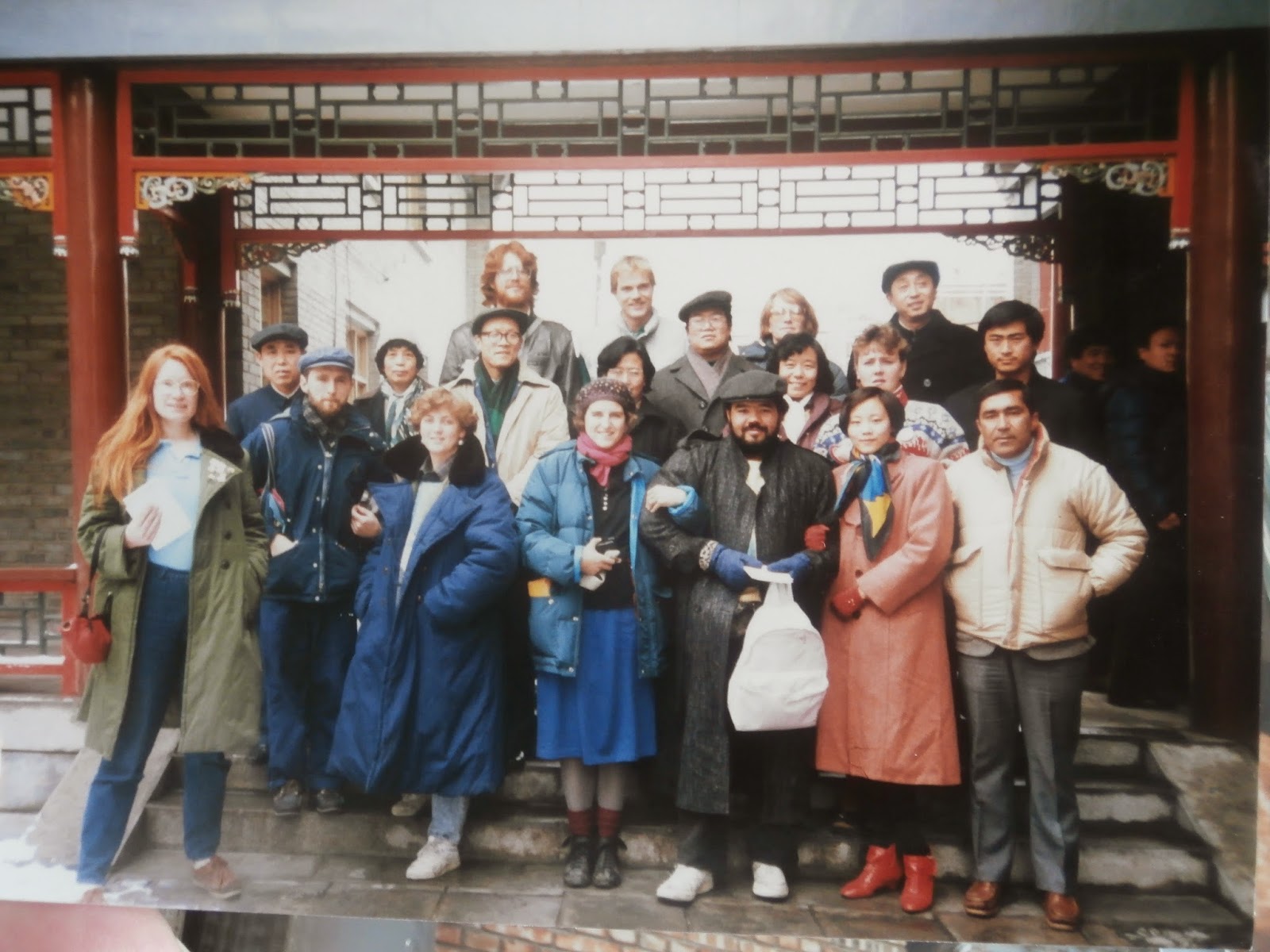“The world is a book and those who do not travel read only one page.”
― St. Augustine of Hippo
I have been asked to tell a few classes about the Culture of China,
in 40 minutes.
That makes me laugh,
because, while I love China, and traveled many places in China by train, and boat, and car, and bike, and airplane - and while I attended College there in the National Capital of Beijing,
at Beijing Teacher's College _ I only barely touched on the culture of China.
Let me tell you what it is like to leave the United States on an airplane and fly so far that you cross the international dateline and find yourself not just in a different place from your family, but also in a different day. I was suddenly in a strange culture, where the most simple and common things became strange and alien. Even toilets were not the same, and how was I supposed to ask for toilet paper if I could neither speak the language nor read the writing?
The Normal things we understand because of a shared culture here were not understood there
A crooked finger was not the sign for come, but rather a whole hand, palm down with all 4 fingers flapping back up toward the palm and the voice saying "Lai, Lai" was how a person in Beijing gestured for us to follow.
A woman wearing white would not be a bride because white was the traditional color of mourning for funerals, and bright red was the rich, prosperous color that promised a happy life at a wedding. Yellow was the royal color, not purple.
A simple hand gesture or a common word in The United States might mean something offensive there. And if you mentioned that you had a toothache they might take you to a dentist sitting on a chair on a crowded street next to a pile of garbage and a woman giving haircuts and ask which tooth needed pulled.
Instead of offering you and ice pack or an ibuprofen for a headache, they would just as likely offer to rub tiger balm on your neck and stick a long needle into the calf on your leg. And if you were willing to try their "cure" chances are good that the headache would go away.
If you went to a market, and the owner was taking your money, he might not use a cash register, or a calculator, but instead an old box of wires and beads that he could use faster than you could use a calculator, and the kids would use one for their math homework too.
The Abacus is fast and accurate and very, very old school. The oldest known use in China was 200 years BC.
Speaking of homework, and school, they go to school 6 days a week there, and start early with school wide exercise, but they go home and take a nap every afternoon, before coming back in the evening.
The kids would learn a language where they didn't ever learn the whole "Alphabet" and what they needed to learn to be literate would take them until about 5th grade, because their written language isn't sounds and letters, but rather it is pictures that the speakers of different languages all recognize. Here if I show you a picture of a house, an English Speaker, a French Speaker, A German Speaker and a Spanish speaker will all call it a different word, but will all know what it is. In China, it was once many small villages, cut off from each other by rivers and deserts and mountains and they developed a written language of pictures everyone would recognize because the people from all those villages had a lot of different spoken languages. How many? One source I saw said there are 292 living languages and at least 1 extinct language, but the two main Chinese languages are Mandarin and Cantonese.
I quickly found that while there were many differences in the common practices, for instance they might eat a long life noodle on their birthday while we blow out a candle on a cake, but there were many important things the same. Kids played different games, but they still played, and laughter still meant happiness, and some of the games were the same.
People were still curious, loving, willing to make a new friend, proud to show off their children, willing to work hard to make a better life for their families. The food looked and tasted different, and it was cooked in different looking kitchens, but families still gathered around the table to eat together, and people were willing to allow a stranger to come home with them and share a meal or two.
Everything I found in China, I found the opposite too. CHINA is HUGE! It is not just any one thing. It is ancient, but it is new and changing too. It is Crowded with over a billion people, but there are quiet lonely places too. There are busy bustling cities and fast moving airplanes, and there are people riding water buffalo and slowly transporting a new refrigerator on an old bicycle.
There are people with no religion, and there are Buddhists, and muslims and Christians and any other faith you can think of. There are deserts and people who live on boats at sea, there are camels and panda bears, there is an old, old history of war and violence, and there is an old, old study of peace and meditation. You cannot learn about the culture of China in one half hour, or in one semester of one year, or one life. China has the largest population in the world, the third largest land size, it has had people living there in pre-history and it became the third country to successfully send a person to space.
This article was written by my hometown newspaper after my husband and I had sent some letters home from our college in Beijing
The Text of the article follows,Goodes enjoy 'Positive Chinese'
by Retha Miller
Former Cody resident Dixie Goode and her husband Greg, students at Southern Oregon State College, spent a semester as exchange students at Beijing Teachers College in China.
The Goodes were with a group from Oregon universities who participated in an Oregon Teacher Education Program with that country. The program included tours of several Chinese cities, the Forbidden City, the Great Wall and Chinese businesses and classes in one of the chinese languages, Chinese History and the Chinese Educational systems. Dixie wrote of her trip in a letter to friends, the source of this story.
The daughter of paul and Priscilla Miller of Cody, Dixie graduated from Cody High School in 198. She and Greg, formerly of Newcastle, are both graduates of Northwest Community College. Greg, a music major, had spent three days in China while on a tour with the Northwest Singers in March 1983, and had vowed to go back sometime.
 |
| a picture taken just before we went to China |
Both noticeable redheads, the Goodes look like brother and sister. Upon arriving in China, they learned that the Chinese exchange officials believed they were actually siblings. They were told that married couples were not allowed to be students or take a dorm room by themselves, and would be charged an extra $200 if they did. They were lucky enough to arrange to get that down to $90 US and not be sent home.
Their home became a concrete dormitory took on the men's floor. Their bed's were hard wooden platforms with thick cotton pads for mattresses, They were given clean bedding every ten days, but did most of their laundry by hand, hanging it to dry from a wire stretched diagonally across their room. However, their accommodations were better than those of the Chinese students and the appreciated that the Chinese had given them the best they had,
They found the Chinese a very "positive society." In spite of poverty and severely crowded conditions, the Goodes found them content, open, honest, friendly and more willing to share than most people they know here.
 |
| the very best of the tourist places |
They found the Chinese a very "positive society." In spite of poverty and severely crowded conditions, the Goodes found them content, open, honest, friendly and more willing to share than most people they know here.
"On jammed, hot buses which would surely result in hot tempers in an American City, they laughed and smiled even while someone was standing on their feet." Inconveniences seemed to be met with acceptance.
The Goodes had one advantage over the other OTEP members. Before leaving for China they had met two Chinese girls in this country, one an exchange student in this country and the other a teacher hired to teach in the Ashland, Or, schools. Their families lived within five minutes of the Goodes' dorm. Both girls gave the Goodes letters and gifts to take to their families and in turn, "both families tried to take us in, they fed us, doctored our colds and showed us around their city," the Goodes said.
 |
| Eating Mongolian Hot Pot with our History Teacher and his family (Sliced Raw lamb you cooked at the table) |
They also became close friends with their Chinese and history teachers and Dixie even, "sometimes found the lack of privacy got to me." There were always invitations to dinner, shopping, the museum or for a trip to the zoo to see the pandas
 |
| The fact that we loved to interact with their children meant many people were soon smiling and showing them to us, when you are only allowed one child that one child means everything to you |
They traveled through China by Car, bike, plane, bus, train, cruise ship and fishing boat, seeing terraced farm lands, cities of 12 million and villages of fewer than 50 people. They visited 4,000 year old temples and modern factories and schools. They stayed a week in a mountain resort that was used earlier by Emperors. They saw Beijing in summer heat and winter snowfall, and in the beauty of Autumn, exploring its streets on bike and on foot, experiencing stares at first and then acceptance.
Dixie described it as a village of 10 million people.
They have set a goal of a return trip, the next time with jobs as English teachers, staying three to five years.
Added: Did Not Happen :(
"If anything was learned during our time in China it was that the globe is not large enough to divide people who care about each other," Dixie Wrote.
 |
| I always felt honored and trusted so much when someone shared their baby with me |
"If anything was learned during our time in China it was that the globe is not large enough to divide people who care about each other," Dixie Wrote.
 |
| Me in the Mao Coat that saved me in Beijing Winter, and a friend from the student Dormitory |
 |
| My husband helping the local children get icicles to explore |
 |
| Our teachers at Beijing teachers College |
 |
| in the rock Garden at the Imperial Palace |
 |
| My family at Christmas |
 |
| Greg |
 |
| National Day in Tian an Men |




















No comments:
Post a Comment